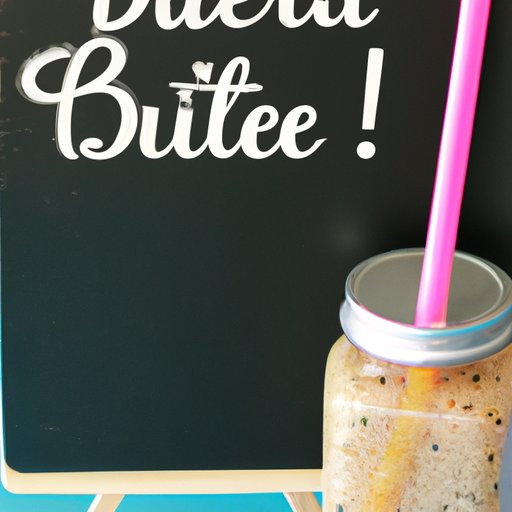
I. Introduction
Are you someone who suffers from gluten allergies and is often left wondering if bubble tea is safe to consume? Bubble tea has become increasingly popular in Western countries, and it’s natural to wonder if the delicious beverage is safe for those with gluten allergies. In this article, we’ll explore whether or not bubble tea is gluten-free and provide options and alternatives for those who need to avoid gluten. We’ll also showcase some delicious gluten-free bubble tea recipes to satisfy your cravings.
II. Uncovering the Truth: Is Bubble Tea Truly Gluten-Free?
Bubble tea is a Taiwanese originated drink that typically consists of black tea, milk, sugar, and tapioca pearls. Bubble tea has gained popularity worldwide due to its unique flavor, texture, and colorful appearance.
When it comes to bubble tea and gluten, it’s important to understand the ingredients that are used in the drink. Let’s take a closer look at the ingredients to determine if bubble tea is gluten-free. The black tea and milk used in bubble tea do not contain any gluten. However, it’s important to note that some bubble tea shops may use non-dairy creamers that could potentially contain gluten. Additionally, some bubble teas may contain other additives such as flavored syrups, jellies, and popping boba that may contain gluten.
After analyzing the ingredients used in bubble tea, we can conclude that while bubble tea is not entirely gluten-free, there are certainly gluten-free options available. It’s important to always ask the staff at the bubble tea shop what the ingredients of the drink are and to inform them about your gluten intolerance or allergy.
III. Gluten-Free Bubble Tea Options That You Need To Know
There’s good news for those who suffer from gluten allergies. Many bubble tea shops and restaurants are well aware of the growing demand for gluten-free options and have taken steps to cater to those who need to avoid gluten. Here are some examples of gluten-free alternatives to traditional bubble tea:
- Green or black tea with fresh fruit juice instead of flavored syrups.
- Fruit teas without tapioca pearls or jellies.
- Coconut milk or almond milk-based bubble tea.
- Chia seed-based bubble tea.
- Bubble tea with rice bubbles or aloe vera as a substitute for tapioca pearls.
While these options may differ from the traditional bubble tea drink, they still offer a unique and delicious experience that is sure to please.
IV. The Pros and Cons of Bubble Tea for Gluten-Free Dieters
While there are many benefits to consuming bubble tea, it’s important to consider the nutrition and potential allergic reactions associated with celiac disease.
On the plus side, bubble tea can provide energy due to the caffeine content in the black tea. It can also be a source of calcium and vitamin D if milk is used in the recipe. However, bubble tea can also be high in sugar and calories if not consumed in moderation.
For those with gluten allergies, consuming bubble tea can cause allergic reactions such as diarrhea, bloating, and stomach pain. It’s important to always ask the staff about the ingredients used in the bubble tea. It may also be a good idea to try gluten-free alternatives to traditional bubble tea if you have celiac disease.
V. Living The Gluten-Free Lifestyle? Bubble Tea Might Be Your New Best Friend
Personal experience can speak volumes when it comes to following a gluten-free diet and enjoying bubble tea. Rachel, who suffers from celiac disease, shares, “When I first went gluten-free, I had a difficult time finding restaurants and drinks that catered to my needs. But after discovering that bubble tea shops offered gluten-free alternatives, I was hooked! I love trying out different combinations of fruits and teas to create my own unique bubble tea creation.”
There are many gluten-free options available in the bubble tea world, and it’s important to explore and enjoy them.
VI. Satisfy Your Bubble Tea Cravings Without The Guilt: Gluten-Free Options At Your Fingertips
Why not try some homemade gluten-free bubble tea? Here are three unique and delicious recipes that you can try at home:
A. Mango Bubble Tea
- 1 cup of ripe mango
- 1/4 cup cooked tapioca pearls
- 1/2 cup of coconut milk
- 1/4 cup boiling water
- 1/2 cup ice cubes
Directions: Blend mango and boiling water in a blender. Add coconut milk and ice cubes to the mixture and blend. Pour the mixture into a glass and add tapioca pearls.
B. Raspberry Chia Seed Bubble Tea
- 1 cup fresh raspberries
- 1/4 cup chia seeds
- 1/2 cup almond milk
- 1/2 cup sparkling water
- 1/2 cup ice cubes
- Honey to taste
Directions: Blend raspberries, chia seeds, almond milk, sparkling water, and honey in a blender. Pour the mixture into a glass and add ice cubes.
C. Blueberry Aloe Vera Bubble Tea
- 1 cup fresh blueberries
- 1/2 cup aloe vera juice
- 1/2 cup sparkling water
- Honey to taste
Directions: Blend blueberries, aloe vera juice, sparkling water, and honey in a blender. Pour the mixture into a glass and add ice cubes.
VII. Conclusion
In conclusion, while bubble tea is not entirely gluten-free, there are many options available for those who need to avoid gluten. Always ask the staff about the ingredients used in the drink and explore different alternatives to traditional bubble tea. Don’t be afraid to try homemade gluten-free bubble tea recipes to satisfy your cravings. With so many options available, bubble tea can be a great addition to your gluten-free lifestyle.





